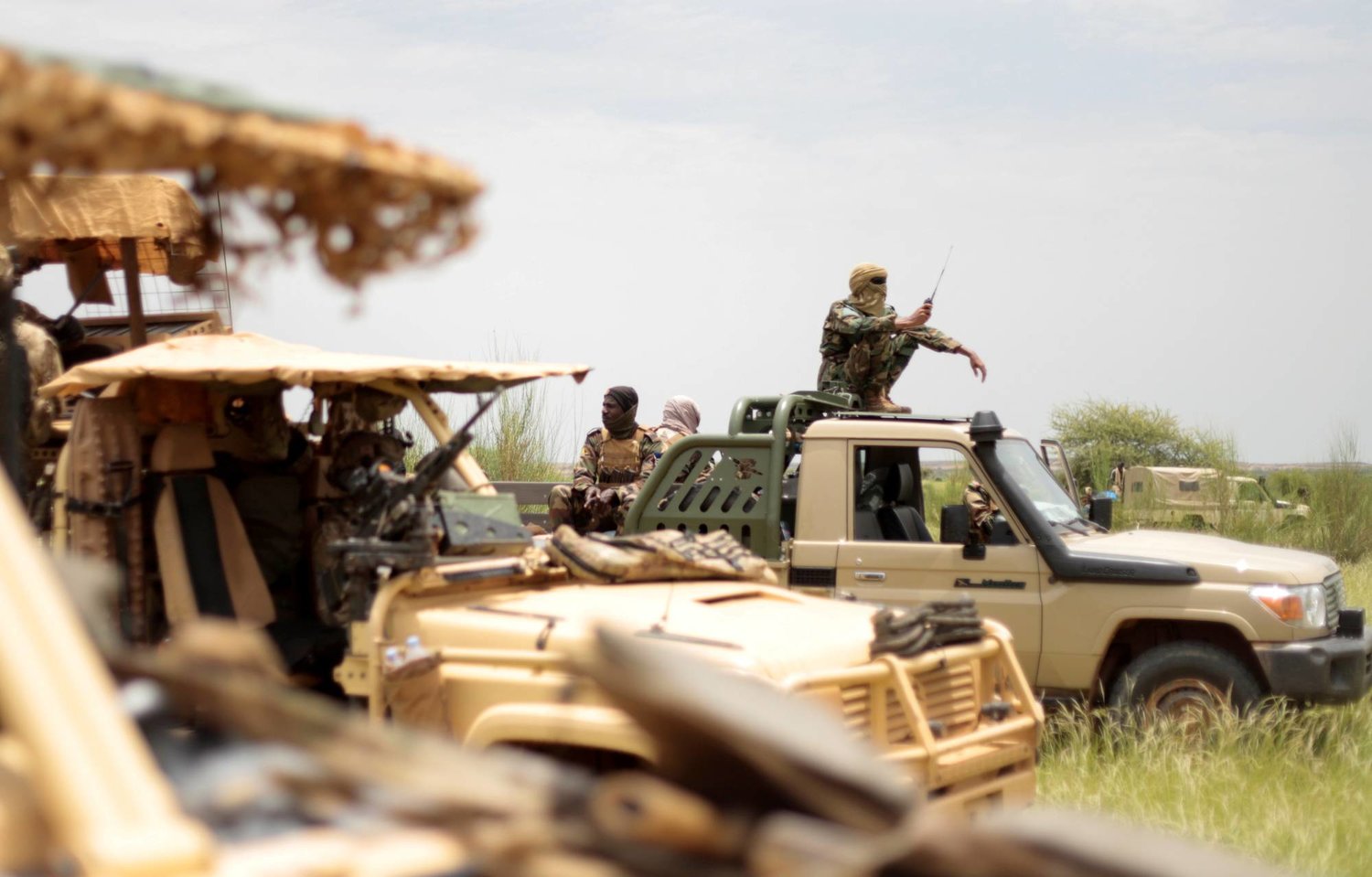The terrorist attack conducted by militants affiliated with the ‘Sahel Province’ branch of the ‘ISIS’ organization, targeting Malian army soldiers escorting trucks heading to Niger on August 3rd, highlights the utilization of the crisis prompted by the military coup in Niger on July 26th. This situation has been leveraged by terrorist groups to intensify their operations once more within the Sahel region.
This attack resulted in the deaths of 16 Malian soldiers and has caused a halt in the movement of trucks from the northeastern Menaka region of Mali to the border with Niger. Notably, within this context, there has been a discernible rise in operational activity since the start of August, aligning with the coup in Niger. This increase contrasts with the activity levels of the preceding three months, as indicated by the count of operations reported in the organization-affiliated weekly newspaper ‘Al-Naba.’
Motivating Factors
Considering the primary change in the Sahel region, which is the coup in Niger against President Mohamed Bazoum, and its potential impact on terrorist activity, given the evolving situation in the upcoming period, there are motivating factors for the possibilities of an increase in attacks by terrorist organizations, the most prominent of which are:
- Consequences of the Possibilities of ECOWAS Military Intervention: Shortly after the military coup against Bazoum, the leaders of the Economic Community of West African States (ECOWAS) gathered in Nigeria to deliberate on how to address the unfolding situation. They issued a one-week ultimatum, demanding the reinstatement of the elected president and the cessation of the coup. Additionally, there was a hint of the possibility of a military intervention in Niger to reinstate constitutional order.
Following the assembly of the group’s leaders, the Chiefs of Staff from the armed forces of the Economic Community member states convened for a three-day discussion regarding the potential implementation of a military approach and the strategies for its implementation. This disclosure was made by Abdul Fattah Musa, the Commissioner for Political and Security Affairs. However, explicit statements either affirming this course of action or detailing the outcomes of the meetings among the ECOWAS Chiefs of Staff have yet to be provided.
Should the decision to employ the military option to address the coup in Niger be pursued, there exists a possibility that it could amplify the prevailing instability. This stems from the potential for a clash to arise between the forces from ECOWAS countries and the Nigerien army. Such a confrontation could trigger internal disruptions, thereby presenting an opportunity for terrorist organizations to exploit this instability, particularly along the western borders adjacent to Mali. This concern gains even more significance due to the likelihood of the Nigerien army diverting its attention towards countering a potential military intervention, potentially resulting in a reduced emphasis on ensuring the country’s security against terrorist activities.
Although the group reaffirmed its preference for diplomatic solutions on August 8th, this does not negate the fact that the possibility of military intervention still remains, especially given the determination of the coup leaders to persist in their actions.
- Support from Mali and Burkina Faso for the Coup: In stark contrast to the ECOWAS group’s unanimous rejection of the coup, Mali and Burkina Faso, both members of the organization, veered towards lending their support to the newly established military council following the coup. Mali and Burkina Faso openly expressed their opposition to the possibility of a military intervention by ECOWAS. Their rhetoric escalated further, characterizing this prospective intervention as tantamount to a declaration of war against both nations.Subsequent to these developments, an officer affiliated with the coup from the Nigerien army embarked on a visit to Mali.
The stance taken by these two nations holds implications that extend to the realm of counter-terrorism across all three countries. Extending military assistance to the Nigerien army could potentially influence ongoing counter-terrorism efforts in Mali and Burkina Faso. There exists a possibility for terrorist organizations to capitalize on this dynamic and escalate their activities amidst the prevailing instability. Furthermore, this heightened terrorist activity could feasibly gain considerable momentum within Niger’s borders, especially at the hands of ISIS, which maintains strongholds in the western regions of the country.
The security situation could deteriorate if ECOWAS indeed proceeds with its previously suggested military intervention in Niger. Such a scenario might prompt Mali and Burkina Faso to extend military assistance to the Nigerien army.
- Implications of Cross-Border Terrorist Activity: If Mali and Burkina Faso choose to provide support to Niger in the near future, whether through military or economic means, this situation is likely to encounter challenges associated with the cross-border operations of terrorist organizations within the Sahel region. This concern is particularly relevant to the borders shared between Mali, Burkina Faso, and Niger.
The aftermath of this situation became evident in a recent assault on Malian soldiers who were escorting trucks en route to Niger. Media accounts highlight the loss of human lives in this terrorist attack, underscoring the need to explore alternative routes for delivering assistance from Mali to the military council in Niger.
The determination of Mali and Burkina Faso to back the military council in Niger and endorse the coup against Bazoum becomes apparent. Consequently, the ongoing provision of aid, irrespective of its form, offers a viable opening for terrorist organizations to orchestrate synchronized attacks on convoys. This tactic hinges on their dispersal across the borders of the three nations to seize hold of this aid for their own purposes. This strategy is designed to impede the flow of assistance to Niger and exploit it to externalize internal pressures for their own gains.
If efforts persist to send aid from Mali and Burkina Faso through overland routes in the near future, despite employing designated routes and security measures, there is a strong likelihood that the frequency of terrorist activities in the Sahel region will intensify.
- The escalation of tensions between ECOWAS and the military council in Niger, combined with the inability to arrive at resolutions concerning the restoration of constitutional order and the release of Bazoum, will have repercussions on domestic circumstances. This particularly concerns the economic sanctions implemented by the organization.
Media reports highlight the impact of these economic sanctions on the surge in prices of essential commodities in Niger, a trend anticipated to persist due to ECOWAS’s continued enforcement of the sanctions. This could trigger public pressures on the military council, subsequently influencing the quality of life and further exacerbating the preexisting substantial poverty within the nation.
Apart from the ECOWAS sanctions, several countries have chosen to suspend aid initiatives. The European Union made known its decision to halt its economic support program for Niger, a move swiftly followed by France. Furthermore, the United States has partially frozen aid to Niger. These measures are anticipated to exert considerable pressure on the military council, particularly in light of the far-reaching consequences of aid suspensions on the economic and living conditions.
Collectively, the decline in economic and living standards could potentially catalyze an expansion of the existing instability, potentially leading to demonstrations against this deteriorating situation. Additionally, this decline might bolster the capacity of terrorist organizations to attract fresh recruits, leveraging the financial resources or essential provisions that these groups can provide.
- Halting Military Aid Programs: Numerous Western nations have actively assisted Niger in its endeavors to combat terrorism under Bazoum’s leadership. These efforts encompassed hosting a segment of the French forces that redeployed from Mali following strained relations attributed to the military coup. Moreover, the European Union embarked on an independent mission, while the United States extended support to the Nigerien army for its counter-terrorism initiatives.
The consolidation of the military coup is poised to have a substantial impact on military aid initiatives primarily aimed at training and enhancing capabilities to counteract terrorist threats. In light of the ongoing crisis, these programs could potentially face cancellation or temporary suspension. This is especially true since the military council in Niger has terminated agreements with France. However, France contests this decision, deeming the council an illegitimate authority.
Irrespective of whether actual military agreements and aid programs for the Nigerien army are officially terminated, considering the current trajectory of the crisis, the existing scenario cautions against a diminishing focus on counter-terrorism endeavors. Such a shift could potentially result in an escalation of terrorist attack rates.
A Key Variable
The forthcoming months’ anticipated upswing in terrorist attacks within the Sahel region hinges not solely on the routes chosen to resolve Niger’s post-coup crisis against Bazoum. However, this factor will persist as a pivotal determinant, holding primacy within the region. This could potentially lead to a surge in the operational scope of terrorist organizations, which will intersect with other variables pertinent to the efficacy of counter-terrorism strategies in the Sahel nations.
Broadly, it is predicted that terrorist groups will exploit the turmoil in Niger, particularly if the situation remains uncertain regarding Bazoum’s reinstatement and the new military council’s ability to establish coup solidity. Such a scenario might involve attracting regional and international backers, with Russia notably included, to position Niger as a nexus of conflict and polarization on the global stage.


